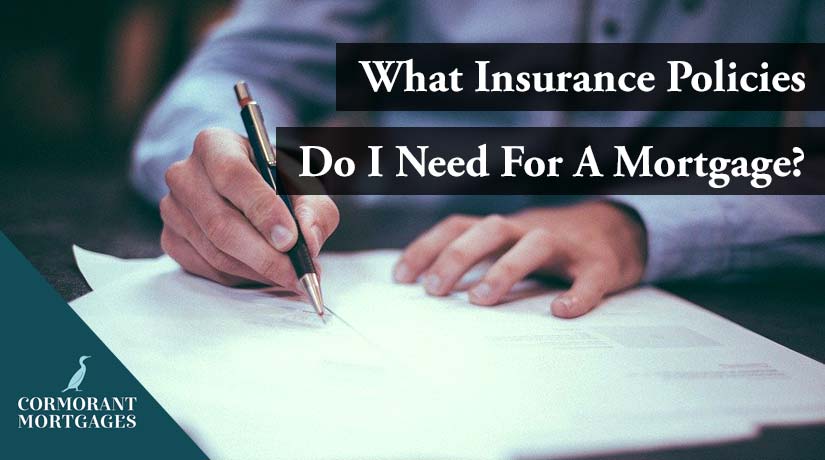It is very important to consider what types of insurance you need when taking out a mortgage.
Most types of insurance are optional but building insurance is usually compulsory when you have a mortgage.
In this article, we explore each type of insurance and which ones you need to consider before making a property investment.
Read on to find out more or click a link below to jump to a chapter of your choice.
Chapters
- What is Building Insurance?
- What Other Types of Insurance Should I Consider?
- Why Do I Need Life Cover?
- What's the Difference Between Life Insurance & Life Assurance?
- What is Critical Illness Cover?
- What is Income Protection?
- How Do I Decide What Insurance Policies I Need?
What is Building Insurance?
This insurance covers the cost of repairing/rebuilding your home if it were to get damaged by such things as a fire or a flood.
If your home was damaged and you didn’t have buildings insurance, you would still be liable for your mortgage payments.
In addition you would have to pay for the rebuild of your home yourself!
It is important for you to be aware that building insurance needs to be in place upon exchange of contracts.

What Other Types of Insurance Should I Consider?
The largest expense in your life is likely to be your mortgage, so it is vital that you think about what would happen if you are no longer able to pay it.
With this in mind, there are a couple of different types of insurance that should be considered.
Even though they are not compulsory, they can help you with your mortgage payments should your circumstances change.
The three types of insurance that can help you pay your mortgage are:
- Life Insurance/Assurance
- Critical Illness Cover
- Income Protection
Why Do I Need Life Cover?
If the unthinkable happened and you died, how would the mortgage be paid?
People often take out a life insurance or assurance policy when they get a mortgage as it means that the lump sum could be used to pay off the remaining mortgage should you die.
This type of insurance, although not necessarily a requirement of the lender, can be particularly important if you have children or other dependants who live with you in the house you have a mortgage on, or if you have a joint mortgage.
What's the Difference Between Life Insurance & Life Assurance?
These types of insurance are similar in that in both cases you normally pay a regular premium to the insurer and then upon your death, they pay out a lump sum to your beneficiaries.
However, these two types of insurance are not synonymous, there is a distinct difference between the two.
Assurance is something which is 'assured' to happen i.e. your death.
A life assurance policy pays out 'when' you die, not 'if you die' whereas life insurance is based on something which might happen (again, your death); but during a specific time period.
Life assurance usually has some form of investment value attached to it.
This is because the value of the policy is expected to increase over time.
Decreasing life insurance cover is often used for the term of a repayment mortgage or loan over a fixed period of time.
As the amount payable decreases, so does the life cover available.
Most life companies will offer life assurance as well as life insurance, but life assurance can often be more expensive.
What is Critical Illness Cover?
If you are diagnosed with a serious condition, like cancer or if you suffer a stroke, critical illness cover pays out a lump sum.
You can include critical illness cover as part of your life cover or take it out as a separate policy.
The diagnosis of a critical illness can turn your life upside down and you are often unable to work.
The last thing you would need at this time is the addition of financial stress so critical illness cover can be worth its weight in gold.
It is very important to check the details of each policy before you buy to see what conditions it covers and what are excluded.
Not everyone considers critical illness cover as their best option however, as they may have other plans in place to help them financially such using their savings to supplement their loss of income or relying on an employment benefit package.
There are three different types of critical illness cover which are:
- Increasing Cover
- Level Cover
- Decreasing Cover
With the increasing cover insurance the premiums and the payout amount rise each year with the rate of inflation whereas with the level cover the premiums and payout stay the same for the duration of the policy.
With decreasing cover the payout reduces each month which means that the premiums are usually lower than those of level cover.
This cover can be used to follow your mortgage as it is repaid.

What is Income Protection?
This type of insurance provides financial support if you suffer a loss of earnings because you have to have time off work due to injury or illness.
You can choose the duration of the policy ie one that lasts for just a year or one that covers you up to your retirement date.
The longer the policy, the more expensive it is.
This type of policy can be considered particular important if you are self-employed because you don’t receive any sickness pay and therefore rely on your health to make a living.
Most illnesses that leave you unable to work are covered by this type of policy however, it does not pay out if you are made redundant.
How Do I Decide What Insurance Policies I Need?
Everyone’s circumstances are different so it is important to consider your own personal situation before deciding on what cover you might need.
Some of the most important points to consider are:
- • what would happen financially if you were seriously ill or died
- • do you have any financial dependants
- • does your family currently have any financial support
- • what financial support might your family need in the future
- • can you afford to pay regular premiums or a lump sum
- • factors that might affect your premiums - your age, occupation, lifestyle, pre-existing and family medical history
It is also worth noting that you should review your insurance cover regularly as circumstances can change and you want to make sure that you have the most relevant policies.
If you would like to discuss your protection requirements contact us now.
Our specialist adviser will discuss your particular situation and budget and will select the relevant policies from a panel of leading insurers to suit you and your needs.
We do not charge a fee for this service so don’t delay, get in touch with us to arrange a consultation.
Liked this article? Try reading:
Reasons Why Now Is The Time to Remortgage Your Property
Disclaimer: Cormorant Mortgages does not provide advice in relation to savings and investments. This article is intended for discussion only and does not propose financial advice in any way, and therefore should not be construed as such. Your property may be repossessed if you do not keep up with mortgage repayments. You may be able to obtain cheaper deals by going direct to a lender.
